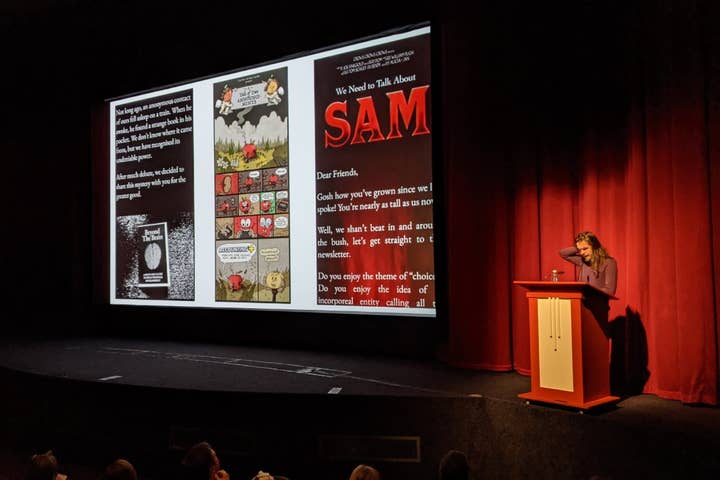"Where should you put your time in marketing? Fun fact: emails"
Crows Crows Crows founder William Pugh on how an email newsletter became a more effective marketing tool than Twitter, Facebook and Instagram combined
The abundance of accessible communication channels can make low-cost marketing a confusing proposition. However, Crows Crows Crows founder William Pugh found the most effective tool for selling new games was also the most unlikely: email.
Speaking at the Yorkshire Games Festival, Pugh traced the arc of his career to date, which started brightly with his work as designer of The Stanley Parable -- one of the great indie success stories of the last decade, and as Pugh described it, "the big net gain in my financial career."
Pugh founded Crows Crows Crows in 2015, and the Berlin-based studio has released more products for free than it has games for sale. Dr Langeskov, The Temple of No, The Club; while none were entirely suitable for a commercial release, all were given away to the studio's audience.
"Most big studios bombard you with ads, but we don't have all that money"
This is a huge risk commercially, of course, but Pugh highlighted the important function these games served in establishing and reinforcing the studio's distinctive personality -- and in building a community that would eventually be the foundation of its market.
"Marketing is the most important part of making money, but probably not the most important part of making games," Pugh told the Yorkshire Games Festival audience in his keynote talk. "In terms of marketing done well, I'm a huge Valve nerd. I wanted to work there until word got out that it was terrible."
His own approach to marketing was influenced by Valve's Team Fortress 2 -- "the thing that used to be played by children before Fortnite" -- which would accompany each game update with a web experience that featured detailed renders, stories from the game's universe, and other "little hidden things" that captured the essence of the game itself.
"We combined the whole Team Fortress, rich-text, 'this is a slice of the game world' [approach] with our characterful studio persona, and put these in [an email newsletter]... This worked for announcing a product, releasing soundtracks, doing little comics, updates to the game, trailers to old projects."
"It's actually content designed to be entertaining, to be unique, to be talked about"
These emailed updates are collected on the Crows Crows Crows website, and all are shot through with the same subversive, anarchic, irreverent tone that is so important to its games. Consider this announcement for the VR title Accounting+, or this Halloween update for its user-generated music MMO The Club -- each serves a business purpose, but each is entertainment in its own right.
"This is all part of a thing called marketing, which is very important," Pugh added. "There's a billion different ways to do marketing -- most big studios bombard you with ads, but we don't have all that money. What we did instead was linked all of the free games to our [email] newsletter. Where should you put your time in marketing, because you're one person and you're a finite resource? Fun fact: emails.

"It's a format for us to do anything. We're not talking about the studio here -- 'Charlie got a new stapler today. Stay tuned for more updates from Crows Crows Crows' -- it's actually content designed to be entertaining, to be unique, to be talked about. Stuff that people can print out, stuff that people can listen to, which ups the value of this thing."
By ensuring that each newsletter communicated Crows Crows Crows' identity, and putting clear links between its free games and email sign-ups, Pugh's studio managed to amass a mailing list of around 80,000 people in the space of four years -- a considerable number for a team of just a few people, and a more engaged audience than is easily found on other communications channels.
"Emails had a higher conversion rate than Twitter, Facebook and Instagram put together"
"Emails had a higher conversion rate than Twitter, Facebook and Instagram put together, basically," Pugh said.
While not every person that follows a link in an email to a storefront will end up buying the product, that traffic has other knock-on benefits. Most major distribution platforms are curated by algorithms, Pugh said, and those algorithms are geared around metrics like sales and traffic in the first days that a new game is on sale.
"If you can find a reasonable amount of people that will go to your storefront, you can knock your game out of the 'hey, it's new' category, and into the 'hey, it's hot and new and rising' category. If that does well, it can go up to the top-selling games of that day... and that's how you snowball."
With 80,000 people receiving any given announcement, and the nature of the content making those people more likely to actively engage with it, Crows Crows Crows has gradually built a stable platform from which it can do business while retaining its identity. While Pugh was eager to remind the audience that they shouldn't expect a hit like The Stanley Parable from methods such as these, it is a basic approach that can serve smaller developers well.
"Being typecast works really well," Pugh later said, in response to a question about his studio's unique persona. "Because essentially, if people will remember you, that's great. You're already beating out everybody who has been forgotten -- which, if you think about it, is the majority of people in history.
"I've got consistent work, I've been able to make things I'm interested in. I'm very lucky, I think, and any problems I have are no problems compared to other people."

